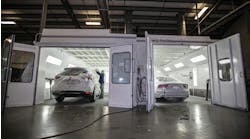Change.
It’s uncomfortable, it’s frustrating, sometimes it’s even something to fear…and in the automotive industry, it’s unavoidable.
Independent auto repair shop ownership and management are no strangers to change. Technological innovations and societal trends disrupt our industry every few years, forcing us to train in new ways, buy new tools, and adopt new ideas. But we can already see the next round of changes coming to our industry, and it’s now more important than ever to be prepared, and to be ready to embrace new ways of running your business!
First and foremost, the national shortage of technicians is a major problem and one we’ll be dealing with for quite some time. Our society as a whole has devalued skilled trades, meaning that for years now, young people have been hearing at home and at school how they should be avoiding careers like automotive technician.
Kids simply aren’t aware of the opportunities that skilled trade training can offer them. As a result, the average age of a mechanic in the United States has gotten older and older – currently somewhere in the mid-40s.
While this is a large-scale problem that is beyond your shop’s immediate control, you can still take steps to ensure the impact of a labor shortage isn’t felt as harshly as it could be – starting with taking a good hard look at the systems you use in your daily operation.
One problem a lot of shops seem to inflict upon themselves is putting up too many barriers for techs to be efficient.
Here’s a common example: the tech has to use programs that don’t talk to one other. So when he wants to use a labor guide, he has to copy the VIN from his point of sale, paste it into a labor guide, use endless dropdown menus to find the labor time…and then repeat the process when he searches for a second labor guide to compare.
And that all assumes he didn’t get logged out by another tech doing their own labor guide lookup.
The amount of time techs have to spend logging into websites and typing the same search terms is staggering, not to mention inefficient and unproductive.
And what if that young technician overcomes these inefficiencies, comes to love their career, and eventually wants to set out and own a shop of their own? They get to look forward to the same -- only now it’s not just one facet of their job that’s inefficient, it’s all of them. Their marketing program doesn’t communicate with the point of sale. Their labor guides don’t talk to the repair order estimates. Their inspections don’t work closely with the parts ordering. Each component of their job, in every phase of the repair, is managed by a different software, part of a different subscription, and each is draining hours out of their day, out of their employees’ days, and out of their customers’ days. Hours….AND money.
It’s really no wonder that we’re facing a national technician shortage, when that’s what we have to put up with just to do a job we love!
Or used to, anyway.
Some products are finally emerging onto the scene that give shops techs, service writers and owners alike the ability to do all parts of their job from a single program. For the first time, each critical component of the shop is able to talk to one other, so the entire shop can stop with the endless re-typing, re-logging in, re-searching, re-copying and re-pasting just to do their job.
Maximizing efficiency and time management are two big keys to overcoming the labor shortage in our industry, and a system like I’ve described is critical for accomplishing this.
In keeping with the theme of using technology to improve your shop’s day-to-day productivity, the impact that Artificial Intelligence (AI) is poised to have on our industry – and society in general – cannot be overstated.
In several ways, AI is the answer to many issues we face as independent shop owners. We can better diagnose vehicles, advertise and market much more effectively, and save a tremendous amount of time in every bay and at every desk when we employ the proper AI-infused algorithms to work with our skilled teams.
AI can also eliminate human error – a major profit-drainer for shop owners – by making both diagnosis and repair operations more precise. Machine learning will furthermore help your staff accomplish many of the more mundane-yet-critical tasks they need to get done – profit management for example – which will, again, afford them more time to focus on bringing money into the shop.
Technological innovation is also contributing to new-and-exciting vehicle designs that might seem daunting or frightening but, in my opinion, are nothing to fear at all! Cars today are built with composite materials that would seem futuristic to technicians not that long ago. There’s also a lot of buzz about self-driving cars coming down the pipeline — and make no mistake, this technology will be available to consumers at some point in the 2020s.
Our industry has benefited from increasingly complex onboard computer systems making it tougher for drivers to perform basic repairs on their own. And in my opinion, we’ll continue to see car owners seek out the pros for their repair needs moving forward. You’ll obviously need to keep the latest and greatest tools on hand, but that’s nothing new for our industry.
To me, the trend of more sophisticated engines and computerized vehicles is also a fantastic opportunity to attract a different breed of future technicians, managers and advisors -- individuals who are technically gifted and interested in the many forms of technology that are emerging in our industry and so many others.
A community college in Michigan is already offering a course in self-driving car repair that is attracting science-minded individuals who might not have otherwise considered a career in vehicle maintenance. These new individuals will see auto repair in a different way than previous generations, which will potentially make up for the current trend of young people being reluctant to fix cars for a living. That being said, however, the next wave of auto repair professionals will force many shop owners to make a philosophical adjustment. If we’re slow to embrace the tools, the training, the management and the systems that make our shops efficient and competitive, we’ll never attract the kind of technician we are going to need in order to survive! We need update our systems and streamline our day-to-day operations.
This effort includes utilizing the same technologies that are being incorporated in the mechanical aspects of our vehicles and shops to help us improve the human side as well. You simply cannot replace human contact with bots – that’s been proven over and again in retail businesses. But you can use machine learning and AI to improve your technical processes and create better efficiencies so that your human staff can gain a deeper understanding of the vehicles, the processes and even the customers they’re dealing with.
Perhaps more importantly, as computers begin to take on more of the mundane tasks and make us more efficient, it gives us the adequate time we need to apply to creating a deeper, more mutually beneficial relationship with our clients, customers, and even our staff.
The most important thing to keep in mind as we head towards a new era of auto repair is to step outside of your comfort zone. Just because something is “the way it has always been” doesn’t mean it’s the right way of doing things. And could very well be a reason your shop is having trouble recruiting the right staff members and attracting quality customers.
Auto repair is an exciting industry and the new technologies I’ve mentioned are poised to be a huge draw in helping a new crop of technician want to be a part of what we’re doing.
More often than not, change is a good thing, and technological innovation can prove to be a great thing for our industry. Just like anything else though, you need to have the right tools, the right procedures and the right attitude to get the job done!




